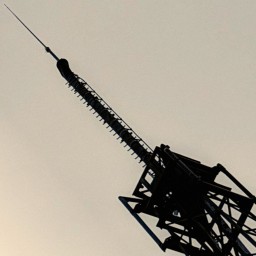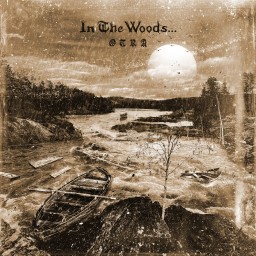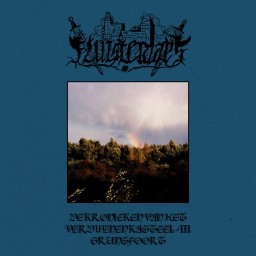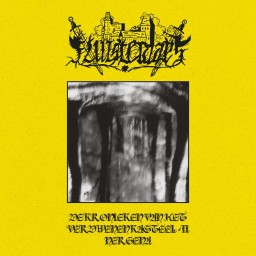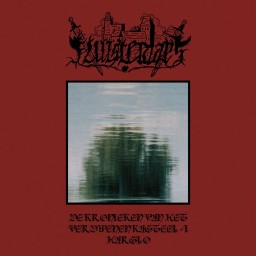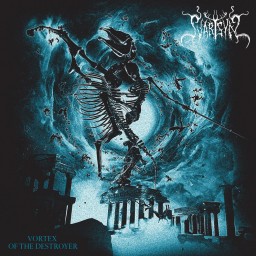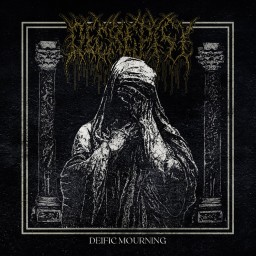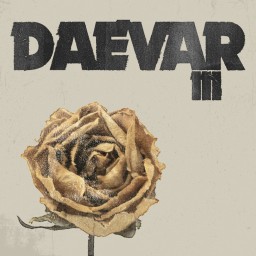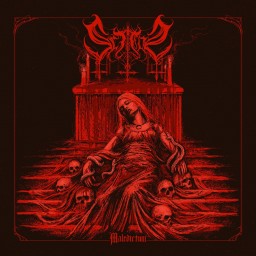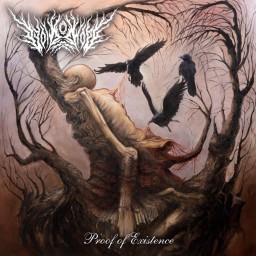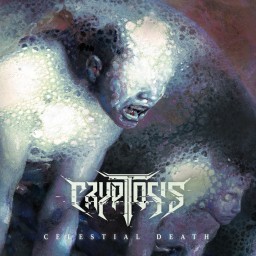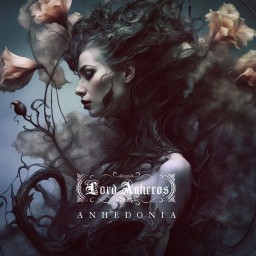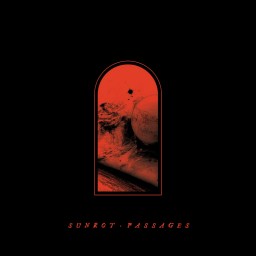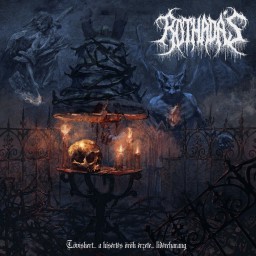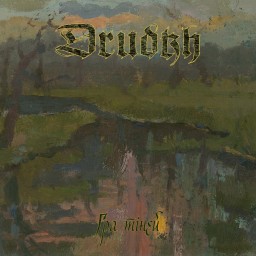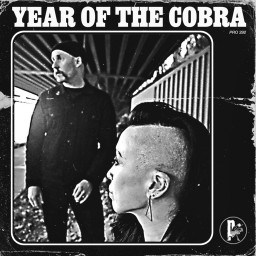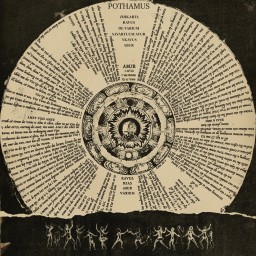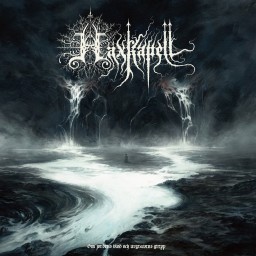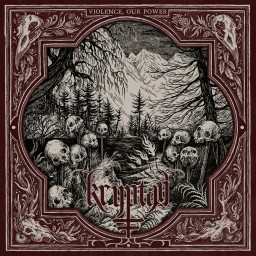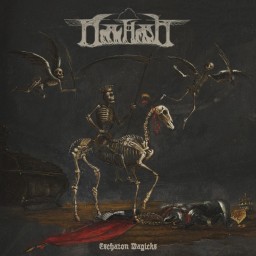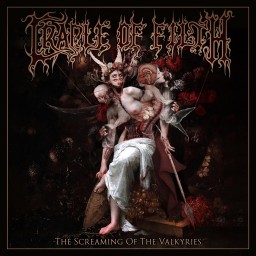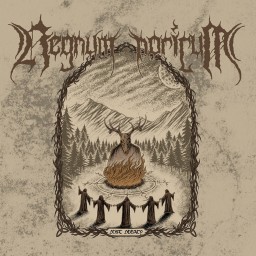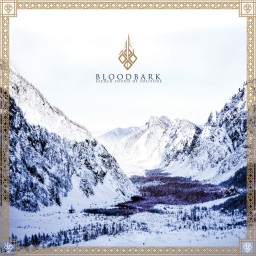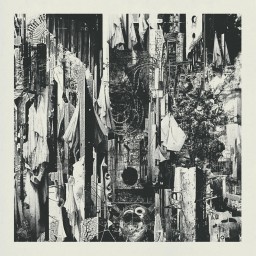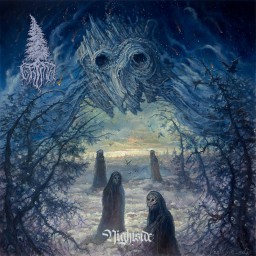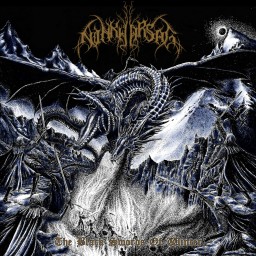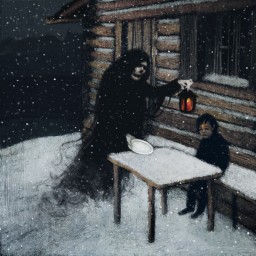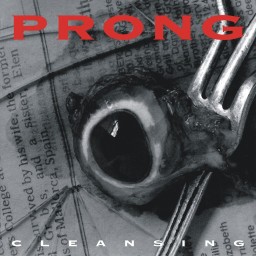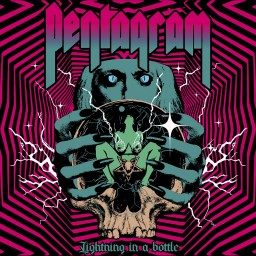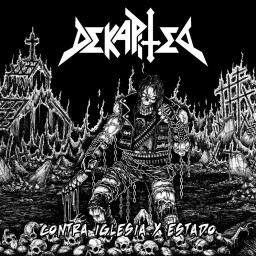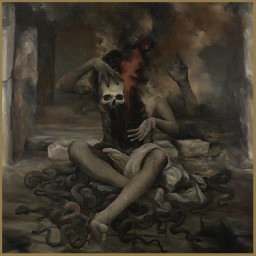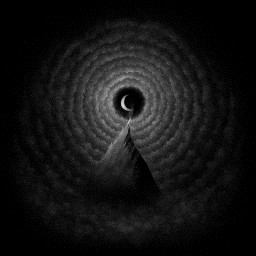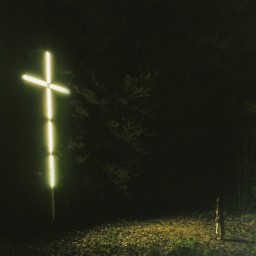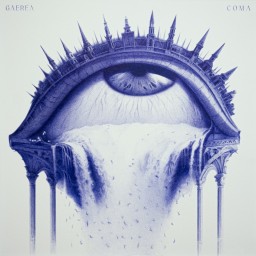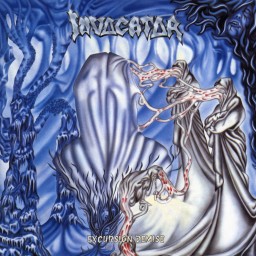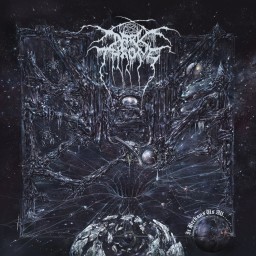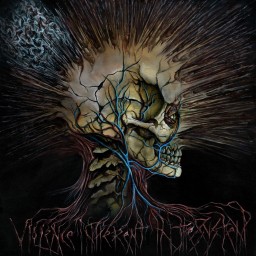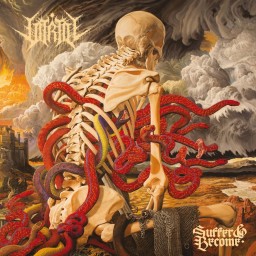Vinny's Reviews
Another mysterious black metal outfit of whom nothing is known about the band members, Blood Abscission have landed their sophomore release (the aptly named II) via my favourite label, Debemur Morti Productions. Fact is, I am not always that interested in the people behind the music, in fact sometimes that information is very much best left unsought. What you can tell from II is that whoever is involved, they know who to write excellent atmospheric black metal. More than this though, there is a clever blend of old school metal melodic leads mixed in alongside some near gazey-like passages. As such, Blood Abscission seem to make a very contemporary take on black metal, yet at the same time manage to keep lots of nods to past glories as well.
I am very much reminded of 777-era Blut Aus Nord when listening to II. That blend of the coherent and luscious instrumentation, coupled with unintelligible vocals (and spoken word at times) is delivered perfectly here, putting all the attention on the music. The more modern take I get from the record though is Mare Cognitum inspired melodic urgency and scurrying tempos. The tremolos get quite shrill in places, suggesting some stringed folk instrumentation alongside the electric elements here and there too. If ever there was a band befitting of residing on DMP’s roster, Blood Abscission are it. The focus is absolutely bang on here, capturing all the right elements I want to hear in my atmo-black. At times when I listen through to the record, I am reminded of Grima’s triumphant record from this year also.
I read criticism that II was too lengthy for one reviewer and I normally am one of the first to call out if a record outstays its welcome. However, Blood Abscission, as well as having great content, have track lengths nailed down also for me. I do not feel the album works as a casual listening experience though by any means. If you are just looking for background music, then this album fundamentally does not apply. The final three tracks all grow into each other, passing on the baton to each other as they flow superbly together (for this reason, the album is superb bedtime listening on headphones I have found – to truly appreciate this great piece of compositional aptitude). Even the twelve-minute plus opening track does not ever become a chore and sets the tone perfectly for the rest of the album. Who fucking cares who the band are? With music this studiously put together, you have more than enough to concentrate on already.
Genres: Black Metal
Format: Album
Year: 2025
In the Woods… have always just ‘been there’. Floating around the periphery of my metal music awareness for years, with me rarely paying them any attention. The progressive tag is usually more than ample to put me off things but given this was dual tagged with gothic metal (another one of my areas of limited interest) and I am trying to broaden my horizons and capture as much new stuff in The Fallen as I can this year, I broke form and went for it. I am glad I did.
What is clear, even as a relative newbie to the band, is that these fellas know how to write songs. There’s obvious depth to all the tracks on this album. Emotional and compositional depth is present in equal amounts, and as a result Otra is an incredibly rich and rewarding album to listen to. There is the mournful atmosphere you would associate with the gothic tag, but there is also the sense of mystery, of some riddle that runs in secret through the album, like there’s always something more to come on each track. It is this narrative of intrigue that keeps my attention on the album from start to finish. This intensity by no means impinges on the overall relaxed vibes that come off the record as it plays. The vocals have a soothing monotone to them, a handsome charm almost. Even on the death doom sounding section of ‘The Crimson Crown’, the menacing vocals are tempered by most of the track being sung in a clean and sultry tone.
I would liken the connection I feel with this record to the same spontaneous response I had to Katatonia’s The Fall of Hearts. I can sense the dark soul behind the music, its presence obvious throughout. As I was ploughing through other releases this week, I got to The Maneating Tree’s latest album, and it just underlined the difference in quality in that Otra is interesting to listen to from the off. Otra lacks much in the way of a generic pigeon-hole to be sat in and as such, all bets are off. The juxtapose of styles somehow remains unintrusive over seven tracks that all seem to flow with an underlying air of calm. Hear the black metal vocals creep into tracks like ‘Things You Shouldn’t Know’ and ‘The Wandering Deity’ whilst enjoying vibrant progressive vibes in some of the guitar at the same time.
For all its free-flowing nature, there is no sense of reckless abandon in the playing. At no point do I feel the need to hit the skip button, which on an album that is infused with gothic and progressive tropes is no mean feat really. There are clunky moments still. ‘A Misrepresentation of I’ stands out for the failed attempt to shoehorn that title into the chorus (it sounds like ‘a misreputation of I’) but it is more than forgivable given it probably is my only negative out of over forty-five minutes of music.
Genres: Gothic Metal Progressive Metal
Format: Album
Year: 2025
The final EP (to date) in this series ‘…:Grunsfoort’ harks back to the jangly tremolo and melodic gallop of Drudkh to kick things off this time. Opening track ‘Sediment der Impressies’ again picks up where the previous EP left off some 18 months ago, trailing an air of accessibility and directness to its presence. For the most part, this is a well-balanced track in terms of pace. It measures the urgency of the tremolo with passages of thoughtful refrain and folky strings that really sound like they are grounding the track. There is also a strong bass presence here as well which really does add depth to the slower parts. The track does seem to lose its way about two-thirds of the way through, disappearing into an unexpected dark ambient section before racing back for the final meeting. This feels disruptive, like they thought about ending the track there but changed their mind.
The strong, yet never intrusive bass, is retained on ‘Grunsfoort in de mist’. Opting for a slower pace to start this time around the track also deploys acoustic strings to good effect, using them to herald the arrival of additional layers on proceedings. This is the standout track on the release for me. It is thoughtfully composed and builds up well. The rich melodic aspects are never at the expense of the directness and despite the more softer approach, the band avoids ‘gaze’ territory in the main and still delivers a haunting and ethereal experience to draw the track to a close.
Whether this is the totality of the series or not, these three EPs are strong as a collective. My criticisms are never items that necessarily diminish from my overall enjoyment of the series and they do showcase the talent, ability and influences of the duo involved here. I would recommend playing them back to back to truly appreciate them but they do also work in isolation.
Genres: Black Metal
Format: EP
Year: 2025
Landing just three months after the first EP in this series, Fluisteraars picked up on ‘…:Nergena’ pretty much where they left off on ‘…:Harslo’ back in March. The dashing tremolos on opening track ‘De man, Zon van de Doden’ coupled with the erratic folk sounding instrumentation alongside more calming, clean and choral vocal sections make for an interesting start to proceedings. Instrumentally, this EP feels a little more complex than its predecessor but it still manages to retain a rhythm that sticks in the brain making the opening track easy enough to follow.
When we get to the second offering here, ‘De Mystiek Rondom de Steen des Hamers’, we see a more direct approach. This folky, chiming and pagan sounding track retains a catchiness that leaves me very much reminded of Havukruunu. It is a very earthy sounding track that use melody intelligently to accentuate the softer nature to the bands sound. It feels very relaxed in pace also and the jangly tremolo is less fuzzy here than on the opening track on the first EP. It is kind of a chilled experience overall on this second track.
For me, I prefer the first EP over this one. Whilst I respect the direct nature and earthiness that gets introduced here, I was kind of enjoying the more chaotic and eclectic elements that got called out in my review of the first release in the series. Still there’s nothing bad here, just not as enjoyable as the first.
Genres: Black Metal
Format: EP
Year: 2023
This two track EP from Dutch post-black metal outfit Fluisteraars, is the first of a trio of releases in the series (I am not sure how many there will be in the end, however the third instalment just got released in 2025). Using the Dutch word for “Whisperers” as their band name is actually a good indication of how I find their sound. Refusing to be drawn on exactly what type of a band they are in interviews, I find them to be a modern take on the the sub-genre of black metal in the sense that they infer a black metal aesthetic but seem to only whisper this. There’s a definite Oranssi Pazuzu vibe to opening track ‘Dromen van de zon’ for instance. The chaos of the guitar is underlined by a shrill tremolo that rides atop of crashing and dashing percussion and wild, shouted vocals.
The jangly edge to the tremolo does remind me of Drudkh somewhat, yet it retains a fuzzy, almost psychedelic and warm tone also. There is also an intensity to the track that brings Wiegedood to mind. That deranged edge to proceedings in particular draws this comparison. Track number two on the release ‘ De konig de werd ontedkt tidens de blootlegging van de nieuwe dimensie’ has the vastness of ‘Blaze…’ or ‘Transylvanian…’ era Darkthrone to my ears. It has a heavy atmospheric element to it also and touches on the horror of perhaps Leviathan or Xasthur too.
Whispered or not, there’s no denying the influence of black metal on the sound of Fluisteraars. The post elements fit well also, arguably being an extension of atmospheric black metal as opposed to outright post-metal. There are chimes and and keys here that would not be out of place on a dungeon synth record and so I would say the influences here are far reaching, beyond what you may initially hear upon putting this on.
Genres: Black Metal
Format: EP
Year: 2023
If I had my time again, I would start listening to black metal a lot sooner than I did. The peak of the scene was around the time when I was just turning into a teenager and there was no mention whatsoever of black metal amongst my metalhead mates at the time. We were all about death metal, thrash metal and heavy metal and I cannot recall the likes of Burzum, Mayhem, Emperor or Satyricon ever entering conversation even, across five years of high school. As such, I have always felt like I have missed out on the true essence of black metal, my initial, stronger, affiliation with death metal being largely because I was watching it grow in front of my very eyes. Whilst I have many memorable experiences listening to black metal in my adult years, some of the same emotions that I feel when listening to say De Mysteriis Dom Sathanas, can never be the same as when I listen to Slowly We Rot. I guess then, that when I am looking for the ultimate experience of black metal when I get to a new release or one that I have not heard despite it being available for years, is that sense of true passion and excitement for the art that I feel I missed out on back in the day. Albums like the latest by Svartsyn.
It is all here for the taking for me. Themes of Satanism, death, ritualistic offerings and dark mythology are what help pique my interest on most metal records. When they are as well integrated into a wall of crawling, lumbering, threatening and menacing black metal music such as Vortex of the Destroyer, then this is the icing on the cake. Ornias sounds genuinely deranged on here, his vocals are as pestilent as the vilest of diseases, his riffs are relentless sorties of marauding layers of darkness hammered home by guest drummer Ignace Verstrate’s (the aptly nicknamed Hammerman) unabating pounding on the skins. It is the dead body the kids find out by the lake one day. Bloated with filth, hissing noxious gases from its orifices, its flesh infested with all manner of crawling things. If you need a quick teaser of VotD at its best, throw on the amazing ‘Utter Northern Darkness’ and you will soon be met with the type of barrage of fury you can expect from pretty much all ten tracks on offer here.
Whilst I will accept that sometimes the mix does lose elements of the instruments, it is a black metal record after all, so production values are not always the order of the day, let’s be honest. Not even this though can hinder the majestic grimness of the album. Clearly written from a place of passion for the darkest of arts, VotD has enough black metal heart to keep me freezing cold for the whole of 2025 alone. It is not polished, it does not rely on atmospherics, and it yet has a sense of balance to its chaos. It has borders to its disorder. With hints of black ‘n roll here and there, the pacing of tracks always feels measured, despite the often-raging intensity. This will be a go to record for me for some time to come.
Genres: Black Metal
Format: Album
Year: 2025
I am starting to amass a fandom for Daniel Butler. After finding Acephalix many moons ago and subsequently Vastum a couple of years later, I know have stumbled across Decrepisy (which I am unsure is even an actual term). In a year that has so far floated my death doom boat very little in the first quarter of 2025, I was instantly full of hope when I heard Daniel Butler and Kyle House from Acephalix were involved in Decrepisy. Deific Mourning I am pleased to say, certainly lives up to the expectations that I have of these artists, and the bands numbers being bolstered by current Morbid Angel live drummer (as well as Funebraum and Ascended Blood sticksman of course), Charles Koryn and Jonathan Quintana on guitars (of Ritual Necromancy and Coffin Rot fame), all works out well for their sophomore release.
Deific Mourning sounds like a beast in the throes of uncontrollable grief for it’s fallen lord. It is like an acid bath of sorrow. The density of the sound is like a mournful millstone around your neck, the cavernous vocals grunting and gurning their dismal and gloomy emotions until they surround you. All the while the guitars chug away in a punishing and laborious drudgery, as if consigned to riff away for an eternity of mourning. The leads when they come, are just as melancholic, sharpening the pain as they seep into tracks. These leads are my only element of criticism on the record though, as despite them having impact, they feel placed rather than planned sometimes. Whilst they by no means ruin any of the tracks, they do have a sense of them being an afterthought on more than one occasion.
Koryn’s drumming is well-balanced throughout the record, coming to the fore especially well on the stripped back ‘Spiritual Decay 1/4 Dead’. It sounds like a professional performance from him. Indeed, the only element that feels a bit lost in the mix is the bass. Kyle handles bass alongside his guitar duties, and so perhaps this explains why the four strings have little presence overall (not that you miss them by any means). The multi-talented Leila Abdul-Rauf (Vastum, Cardinal Wyrm), guests on the record, dropping some menacing synths and additional vocals into the fray.
Album highlight for me is the brooding album closer ‘Afterhours’. I suspect Leila is heavily involved on this one with its looming dark ambience and abyssal echoes. It plays like some agonising cabaret in places, yet as some shamanic ritual in others. It is unexpected at the end of an album that to this point has been so clearly rooted in death doom, but it works brilliantly. The distortion applied to the guitars gives a b-movie aesthetic to the proceedings as the threat builds up and up during the track. Decrepisy may have passed me by with their first record, but I am so glad I did not miss this one. Off to blast me some Acephalix and Vastum for the rest of the bank holiday.
Genres: Death Metal Doom Metal
Format: Album
Year: 2025
Sounds like Windhand. There, got that out of the way early in the review and will try to spend the rest of the paragraphs not mentioning how much this sounds like Windhand (dammit, there I go again). Joking aside, there are worse bands to sound like out there. What Daevar lack in originality they make up for in consistency that eventually overbears even the most ardent of critics. Sub Rosa sets an early tone and sticks to it for the next half an hour. They advertise themselves as having elements of grunge in their sound, an influence I don’t recognise as being that obvious. I can see where it might get called out but in the main, I just hear straight up stoner doom, done well. In a year where I have so far been unimpressed by Messa’s latest offering (there’s a few listens in the tank to go yet but it by no means grabs me like Close did), it is good to find some quality female-fronted doom kicking around.
In their home country of Germany, Daevar are probably pretty much unrivalled in the doom stakes. The quality levels on Sub Rosa are high, and this sounds like a record made by a trio who are tight and used to playing alongside each other. I can’t deem how long they have been together, but they have three albums under their belts now, and this shows here. Balancing all the elements superbly here, the album feels like everyone knows their place with the riffs, bass, percussion and vocals all getting a showing in the sound. There is no sense of jostling for position on behalf of any of the component parts here, probably as a result also of the great production job that allows those hazy and more dense atmospheres to stay present alongside each other so well.
I can’t pretend it will be my AOTY, but there’s a charm to Daevar that makes them great music for summer night campfires. The intense sense of togetherness in their sound is infectious and it is impressive to get such a positive vibe from a record that assess the troubles of the life in the modern 20’s. Whilst it may lack the emotional intelligence of some other artists, it is a success in part because of its direct nature and stark refusal to break from an established sound. Yes, it does still remind me of Windhand, but that by no means is aimed as a criticism.
Genres: Doom Metal Stoner Metal
Format: Album
Year: 2025
Swedes Scitalis are new to my black metal radar with this, their sophomore album surfacing in January of this year. Since then, it has enjoyed a degree of frequency on my rotation list. It is an album that is based on the witch trials of North Sweden in the late 1600’s, and so it flows heavily on the themes of suffering and persecution. What we get therefore is a bm record that retains a real rawness to proceedings (especially the vocals, which I will come to later) yet the band are also unafraid to wheel out some melodicism at the same time and use it in an atmospheric way. The album feels very powerful at all times, and it leans on more than one medium to assert its strength.
Maledictum, is well written and equally as adeptly performed. The storytelling is logical and meaningful without being overly dramatic. The musical representation of the witch trials plays as a very honest and earthy representation of what went on at the time. The playing sounds tight and direct, maintaining consistency throughout the album duration. Whilst this does cause the album to stray into dangerous levels of repetition there are a couple of elements for me that still make it standout. Number one is the vocals. An internet acquaintance of mine pointed out to me that the vocals put them off this release, which was a real shame because they found everything else here to be ‘top notch’. For me the vocals are a real draw. Reminiscent of Nas Alcameth in Akhlys, they are a raspy, throaty whisper style that is not common, not in my bm catalogue at least.
Then we have the drums. Well-paced and kept simple for the most part, they endure the darkness on the fringes of the limelight here on this album to some degree. It is hard to hear past those vocals and the driving riffs but listen closely and the solid bash of the drums is hard to ignore. The blastbeats have a refrain to them almost that is giving the other instruments the space to stamp their authority on the story. They are almost gentle at times on ‘The Suffering’, even at the height of their blasting intensity. Whoever ‘W’ is, their drumming credentials are clear for all to hear.
Scitalis write good records, based on this release at least, and I cannot understand how they have escaped my radar until now. The melodic tremolos on ‘Seven Years ov Blood’ would give Drudkh a run for their money. The charge of the rhythm section is none too shabby either. As solid as it all is though, it does have something missing. There is almost an absence of some synths to add some real weight to proceedings, like the guitars try but can only go so far. For such a serious subject matter, the need for some cold atmospherics seems obvious to these ears. That having been said, Scitalis are deadly serious about their art, that much is clear from these seven tracks. This is a record written by knowledgeable guys and one that sets a high bar for Swedish bm so far in 2025.
Genres: Black Metal
Format: Album
Year: 2025
Void of Hope have managed to churn out one of my favourite bm releases so far in 2025. As I walk through the dirge of releases this year there is a pattern emerging of me finding releases or artists that take me by surprise to the extent that I end up with whole discographies to check out. Void of Hope are a bit easy in that regard as they only have one album to date, and a mighty fine slab of depressive black metal it is. Howling vocals, tortured shrieks, menacing atmospherics, drawn out melodies and monotony to boot, all make for a challenging yet thoroughly entertaining experience.
Whilst researching the album it alarmed me how most blog reviews are basically a copy and paste job from the bio on the group’s Bandcamp page. Come on internet critics, up your fucking game and write some words about your actual experience of the record instead of just plagiarising the cool work of someone else. I don’t really care what temperature it was outside when they recorded this, there was clearly more than enough chill in the air in the studio when this trio laid down these six tracks. The title track is a black ‘n roll blast of iciness across the listener’s bows. Those vocals howl into the very void from which the band take their name. Whoever does the vocals here (guessing one of the guys from Ondfødt as two of them are in the line up) has the requisite amount of derangement in their kit bag to give an authentic level of credibility to them. That is, they have experienced the mental anguish that forms the subject matter of most of Void of Hope’s lyrical content.
There’s variety on this record to. Without ever once giving up on the levels of misery in their music to support their lyrical themes, Void of Hope pull in an eleven-minute plus track ('The Hollow Hymn') alongside a just under two-minute piano led palate cleanser immediately after it. The longer track goes through the whole gamut of black metal, from slower sections to blasting fury, atmospherics to blastbeats, melodic passages to driving, near epic sections. As I understand it, one of the guys from Moonlight Sorcery is involved and so I guess this explains the flavour of the epic and some of the expansiveness. There’s variety in the instrumentation too. Synths and keys permeate the space just behind the strings, vocals and percussion, giving a sense of density to the sound of tracks. These are well balanced, and they feel like they are in a true supporting role, breathing in some elements of atmo-black as they create this fog in the background.
Proof of Existence is not just depressive bm for the sake of it. Like a (good) Shining record, there has clearly been some thought put into this record both in terms of the content it wants to share and how it goes about sharing it. The piano and spoken word of ‘Inner Peace’ is possibly one of the most effective pieces of depressive bm I have heard in many years, and this is what makes PoE standout, I think. The band can be genuinely creative with their mental pain and create something that whilst is innately a negative experience, still comes out positive in the sense of the way it speaks to the listener and all the great things I have referenced in this review already. More please.
Genres: Black Metal
Format: Album
Year: 2025
You know what you are getting with any Mantar record. Sludge-punk rammed right down your throat. Completely devoid of bass as well as fucks to give, Mantar remind of how rock ‘n roll must have originally been perceived back in the day. Their sound has a maverick attitude, a mocking undertone that rumbles through their records where the bass would normally sit. Good news then that Post Apocalyptic Depression absolutely sticks to that formula. With song titles like ‘Church of Suck’ and ‘Rex Perverso’ (roughly translated means ‘King of Perverts’), you will soon the level of cheer this duo is looking to spread this time around.
It is a surprisingly cohesive sounding record given it was written on two different continents. This "quick and dirty" (as the band call it) style pays dividends as the pair bash and smash their way through all manner of influences ranging from the Melvins through to punk. The seedy undertone that gets set early in the record never truly wears off and there is a sense of the listener getting grimier by the track. The drums and guitar make their presence known in equal quantity and don’t ever outshine one another. The vitriol heavy vocals, wheeze and sleaze their way over the music in an almost serpentine-like manner.
If you are looking for variety then you are probably in the wrong shop. Mantar know what they want to say and how they want to say it, and that doesn't incorporate much other than the clear influences I have described on their sound. Unapologetic in their approach and unrelenting in their delivery, Mantar very much like the sound of their voice and as a result this is a near forty-minutes of consistently offensive music. No ballads, no progression or avant-garde elements present here folks.
Genres: Sludge Metal
Format: Album
Year: 2025
As I waded waist deep into new black metal releases this year, a new album from Cryptosis raised an eyebrow when I spotted it in my search list. I double checked to ensure I had not tagged technical/progressive thrash metal into the criteria by mistake, but as it turns out the black metal aspects of Celestial Death are not even all that subtle. Vocalist Laurens Houvast has gone a few degrees colder with his grim voice on this album. This when put in the mix with some cloying atmospherics, Burzum style chimes (check out ‘Absent Presence’ for a dose of Filosofem), jangling tremolos and melodies all makes for a harsh and abrasive experience.
The mellotron is back again and this and the synthesisers do an excellent job of scoring the air around them with a futuristic, dystopian sorrow. That’s not to say that Celestial Death is an entirely slow and atmospheric outing, far from it in fact. The Dutch trio manage to add lots of bite to proceedings and fans of their debut album will welcome this; I am sure. That rabid pacing is still present and tracks like ‘The Silent Call’ manage to balance that scathing attack with the depth of the synths well. In short, Cryptosis’ sophomore is a cracker.
It did take a couple of listens for me to settle down with the action here. My first listen was whilst working and I had thrown this on to get some thrash going in the background and quickly found myself focusing more on the cold and melodic aspect of the record instead. Once I got a couple of more critical listens under my belt, things started to right-size for me a lot quicker. Celestial Death is a very mature sounding record, one that builds on the promise of the debut from some four years ago superbly. The guitar notes on the opening of ‘Reign of Infinite’ positively dance with excitement and the balance between the riffs and the synths and then the percussion is excellent.
I could do with a little more weight in the drums on the mix, but I still feel Marco Prij does a great job, pacing his patterns as the soundscape that continues to unfold requires him to. Houvast’s guitar work is great throughout. It is vibrant one minute, then cold and jarring the next. I have no major criticisms here in all honesty. I am still a little confused by the black thrash combo that relies more on atmospherics above all other things to emphasise that cold influence and it does still feel a little strange adding this into my The North list for 2025. However, it is absolutely a valid entry and is one of the best releases of the year so far regardless of which sub-genre sits as its driving force.
Genres: Black Metal Thrash Metal
Format: Album
Year: 2025
On paper at least, I would have normally avoided Lord Agheros. That album cover screamed gothic metal at me, and so when I discovered no gothic metal on the record, I was immediately caught off-guard. Indeed, opening track, ‘Lament of the Lost’ had me thinking of Wardruna, which was a completely unexpected reference point. Whilst The Fallen is most certainly the correct clan for Anhedonia, there is a lot of different elements musically to digest. Whether it is symphonic, choral, melodic black metal or outright atmospherics, Anhedonia provides lots of angles for the listener to run at it from. It should be noted that some parts of the album sound truly beautiful, being rich in depth.
When they get the arrangement correct, Lord Agheros are quite the accomplished songwriters. However, there are some occasions whereby contrast the compositional aspects of some tracks are clumsy and cumbersome. In the early part of the album, transitions seem to struggle to land all that well. As a result, songs sound like they jerk and jolt around. As the record progresses, this problem does seem to fade in frequency and the second half of the album suffers a lot less from this.
Overall, though, as much as I cannot deny the unexpected allure of this record, it is still dogged by the impression that some sections of the record are a triumph of design over content. I suspect there is some conceptual narrative to proceedings, and this may go some of the way to explaining the sense of some parts being forced to fit together. Credit where credit is due on the ethereal beauty that is inherent behind these issues, they are truly an unexpected bonus. However, they are too few and far between for me when taken into consideration with the whole album offering.
Genres: Gothic Metal Symphonic Metal
Format: Album
Year: 2025
Passages nearly didn’t get a look in when I was jumping through new releases in The Fallen. The EP is one of those releases that does an interlude track and then a proper track which is hard enough to stomach on an album, but over a shorter format so easily could have been a turn off. As it turns out, Sunrot manage to pull it off. The actual sludge content pisses all over the noise interludes for me, to the point where I don’t remember them being there by the time the power of the instruments and the vocals kick in with an Olympian level of fury.
Sunrot make pissed off music for pissed off people. Their music is slamming and juvenile without sounding immature. It’s the hand cupping your balls whilst the other one is punching you in the dick. Both easy and effectively picked targets. They even get Dylan Walker from Full of Hell and Brandon Hill from Cloudrat to guest on the record, so have the respect of grindcore royalty it seems (although Hill’s contribution is to one of the ludes). It is an EP on which I only like two songs out of five though and I cannot help but feel a little short-changed by the experience. It did pique my interest to explore some of the full-length releases by the band though so in a way did still serve a greater purpose. Would have preferred some live tracks instead of the ludes in all honesty.
Genres: Sludge Metal
Format: EP
Year: 2025
Hungary is not normally a country I associate with any metal output, let alone death doom. When I first heard Töviskert... a kísértés örök érzete... Lidércharang I had no idea what to expect, there was a genuine air of mystery that even got me to thinking ‘has any Hungarian even heard death or doom metal, ever?’ Turns out they have, well at least two of them have. Hanyi and Lambert might as well be Finnish though as the death doom they offer is very much in the sound of that geography. In fact, they remind a fair bit of Krypts now I come to think of it. On this, their second album, the duo lumber through a selection of mid-paced death doom tracks. I mean, don’t get me wrong here, it’s deathy and it’s doomy too of course, but it never gets into funeral doom territory.
Lambert deploys a horrific and ghastly vocal style throughout the six tracks here which fits the marauding guitar perfectly, both backed up by Lambert’s thudding drums. Hanyi for his part covers guitar and bass on the album and although you are going to struggle to find the bass in here (apart from on album closer 'Az örök isten Lucifer'), the guitar makes its presence known. On the slower sections it hangs hauntingly in the air, like some horrendous spirit that refuses to pass over to the other side because it is having far too much fun threatening the living. In their more frantic moments, the band sound like a squally death metal act (hints of some Portal at times, to my ears at least) but they have mastered the mid-paced plod style of death doom best.
There’s a groove to some of the riffs here which is a welcome bit of variety that seems to help build tracks as they get going ('Sikoltó füst'), quickly switching to be that marauding beasty style that I mentioned earlier, just in case we need to be reminded of the threat of Rothadás’ intent. At the end of the day, nobody picks up a death doom album looking for variety. It is a safe space for those who know what they like, and this Hungarian duo will tick all the boxes for any fan of the sub-genre. I liked it more the first time I heard it if I am honest, probably because I listen to very little death doom nowadays and I was excited to still find such appeal in my heart for the style when Töviskert... a kísértés örök érzete... Lidércharang first started getting on to my rotation. It is very well put together, but it is nothing outstanding. It is not safe death doom. If such a tag exists, I demand it be expunged immediately. These two know their art and play it with a clear passion, it is just nothing new for me and I feel there’s always one or two records that come out each year like this one. I nod my head appreciatively, holding my chin whilst looking out of the window like some death doom connoisseur, enchanted but not overwhelmed by what I am hearing.
Genres: Death Metal Doom Metal
Format: Album
Year: 2025
Drudkh tailed off for me not long after Microcosmos. A Handful of Stars was a poor follow up to 2009’s triumph of a release and I progressively lost interest in the band. In writing this review, I looked back at some of my ratings for what has come after 2010 and found that on the few I had rated, I had little if any memory of what they sounded like (ratings on relevant releases have therefore been deleted from MA). Whereas I would have once looked forward to a Drudkh album, I found news of Shadow Play arriving landing with a less than muted applause. For me it almost feels like Drudkh have said everything I wanted to hear on their first few records. Those first four albums were the band’s golden run in my book and although they most certainly do have albums outside of that window of releases that I enjoy, I sensed that Shadow Play was not going to see me reaching for the higher end of the scoring range.
My fears were confounded by the frankly boring album opener ‘Scattering the Ashes’, a seven-minute plus track that is frankly one of the dullest pieces of music the Ukranians have ever written. I get the sound of the footfalls in the snow are of someone carrying an urn, however the track itself goes nowhere in between the footfalls that bookend the instrumental. Not a positive start then. Hold on though, both ‘April’ and ‘The Exile’ immediately get me interested in the album again with their driving rhythms and charging pace. The riffs seem to wrap effortlessly around one another, seemingly at home regardless of the tempo being deployed at the time. The rich melody that Drudkh are famous for is certainly still at the forefront of their music. The sound of the guitar alongside Roman’s grim vocals are familiar and welcome sounds. There’s a jangle to a Drudkh tremolo that sometimes sounds like a 60’s psychedelic rock jam. As we get onto the halfway point of the album, things are looking up.
I would go as far as to say that the previous two tracks are a couple of the best songs Drudkh have pulled together in a long time. Solid and memorable, urgent and pressing, as well as sounding like they are performed with passion and guile. ‘Fallen Blossom’ introduces a more aggressive sound, not dissimilar to the overall sound of album The Swan Road. Whilst the melody is still obvious, there is a harsher, colder edge to it on here. Even when the track seems to settle down into a rhythm, it still feels oppositional. The keys do little to soothe this abrasive edge, seeming to support its threat and intent with menacing atmospheres. The track builds into a tumultuous mass of tremolos and percussion, never taking its foot off the gas for the final third of the song. A more melodic opening greets us on ‘The Eve’, even if we are still seeing no signs of the pace letting up in the first instance. At this point I did start to wonder if some variety was missing here, but just as the demons started to have me doubting Drudkh, there’s a swell of accessible, more leniently paced melodies that is cleverly given space to breath and develop before becoming consumed again in the more raging torrents of the track. There is great use of pacing here, even though I missed this on my first few listens, it seems so obvious as I listen through on my review write-up.
Album closer, ‘The Thirst’ sounds like there may be some folk instruments at play in the raging mix that starts the track. I cannot see anything listed other than guitars and keyboards, so it may just be clever use of the keys, but I hear some light droning warbling in the background that seems to be a different pitch to the tremolo that I would normally attribute such sound too. In the end though, Shadow Play is not an album that needs much in the way of expansion. It says what it needs to say very well without much in the way of thrills being needed. It is one of the most consistent Drudkh albums that I have heard in a while and it really is only let down by that lifeless opening track which thankfully soon becomes a distant memory as the real quality of the album soon starts to take over.
Genres: Black Metal
Format: Album
Year: 2025
Whilst listening to Year of the Cobra, I found myself debating how difficult it must be to be in a two-piece drum and bass doom combo. I mean there must be a lot of pressure on the bassist to start with. How much do you yield to the temptation to play it like a rhythm guitar, or perhaps go the opposite way and use the bass to create dense atmospheres like Bell Witch? On YotC, Amy manages a bit of both. She carves out some bone-jangling riffs for sure, yet she also gives us enough bottom end to thicken up proceedings nicely on the tamer sections, when the beefier riffs are on the back burner. You can sense the same dilemna with the drums of course. Do they take precedence over the bass or simply play along in support of the four strings? Again, like his wife, Johanes finds a good balance here. As unremarkable as his performance maybe, the presence he brings cannot be underestimated.
Of course, Amy also has responsibility for the vocals. Her dreamy, stoner/psychedelic style works in great contrast to her heavier bass work. The vocal performance on album closer 'Prayer' stands out in particular with its very personal and sentimental traits making for a deeply heartfelt display. It is not often a doom track manages to invoke emotion in me, but I genuinely fought back tears when listening to that song. As the album highlight for me, it is a shame that such beauty is quite isolated here.
With some sense of inevitability perhaps, YotC suffers to a degree of a lack of variation. Tracks such as 'Alone' lose me completely, and no matter how many times I play the record, I cannot tell you how 'Sleep' sounds. Stronger tracks like opener '...Full Sails', 'War Drop' and 'Daemonium' are sufficient to rescue the record from the lower end of the scoring spectrum. Like I said at the top of this review, tough gig this two-piece doom set up and unfortunately it shows here.
Genres: Stoner Metal
Format: Album
Year: 2025
If they have achieved nothing else, Pothamus have introduced me to a new instrument in the Shruthi Box, an instrument predominantly used in Indian classical music. It is deployed here on single, ‘Ykavus’ where it adds a droning presence to proceedings. Fortunately, this is not my only take from Abur, although it is a distance away from my usual diet, it is still a very entertaining record. There is still some familiar features to compare with the backdrop of my usual listening habits, but the duration of this record in the main is time spent away from my comfort zone. The sludge tag it has on Metal Academy has some relevance most certainly, but it is the post-metal tag that fits the majority of the record better. On top of this though, there are those hints of drone as well as a sense of Middle Eastern infusion.
After a few listens through to Abur with the tribal percussion and dense atmospheres, coupled with echoing chants and expansive keys, it is obvious that a lot of thought has gone into the record. Whilst it might not have an immediate argument for frequent revisits (this very much a mood record) it is a very professional sounding yet artistically endearing album. Where the band are most definitely skilled is in the ability to combine multiple elements on one track, not necessarily blending them, just very capable at arranging them. The title track absolutely feeds off the atmospherics before breaking off into some of the denser sludge content present on the album. When in full flow, the atmosphere here is reminiscent of an Akhlys album, minus the horror of course.
I cannot fight the haunting and ethereal charms of Abur. It is such an accomplished sounding album that is in many ways a shame that it only fits a more serious mood. I will come back to this album when I feel enclosed or suffocated by my existence. When I am sensing my boundaries are the same four walls far too often and I need reminding of how far outside of my comfort zone I can actually go. This is where Pothamus will come into their own for me, occupying the same ‘open when needed space’ as Russian Circles, Wardruna and Forndom.
Genres: Sludge Metal Post-Metal
Format: Album
Year: 2025
Orkalet (the main man behind Häxkapell) is a talented fella with a fascinating background in choral singing – working with Erik Westberg one of the greatest choir conductors in the world - who also uses a process of meditation-induced psychography, or automatic writing to write his lyrics. Basically, the guy writes his lyrics and doesn’t even recognise he’s written them. He can switch these states on at will which makes me think that the lyrical content of Om jordens blod och urgravens grepp could well be written by spirits from another realm. As well as the above, Häxkapell also utilises the services of Oraklet’s wife, Ida for violin, viola and her voice.
As you would expect then, this record is a transcendental affair. With progressive elements sat alongside conventional black metal fare, there is real depth to what Oraklet delivers here. The more pagan/folk elements compliment his baritone vocals perfectly, creating a wholesome and earthy sounding experience. The violin and viola create a classical style of atmosphere to the familiarly grim and gnarly black metal music also. Add in acoustic sections, choral passages and near epic, sweeping elements also and you soon know that you are in for a treat with Häxkapell’s sophomore release. The downside for some maybe that there is a loss of the traditional coldness to the sound that diehard fans of bm would harken for. The sound is hardly warm like say Hellenic bm would fashion in the traditional understanding of such a description, it’s more comforting even though the genuinely desolate and morbid elements are still plainly on show.
The baritone vocals do not always land as well every time they are used and for me there are a couple of occasions where compositionally things are off in general but there are never any moments that make me reach for the skip button. At worst, some tracks seem to suffer from minor issues in terms of a lack of balance. In short, there are occasions where I want a little more black metal in all honesty. These moments are infrequent enough to stop me dropping the rating into the lower part of the range, at the same time however they hold it back from an outstanding score.
Genres: Black Metal
Format: Album
Year: 2025
My high hopes for Kryptan’s debut full length are certainly met by the horrific edge to album opener ‘The Unheard Plea from Thousands of Broken Hands (Intro)’. The pleading voice in the background of the track sets off the old nerve-endings into a jarring frenzy immediately. The intro track then drops into the first proper track on the record and those guitars certainly make their presence felt early on. However, it does not take long for things to start to unravel. The drums remain audible but unintrusive throughout and as a result come across as lacking in power. By comparison the bass is virtually non-existent in the mix, which instead sees the synths, guitars and vocals get centre stage.
The main issue I have with Violence, Our Power though is the vocals. Whilst not horrendous by any means, I do question their suitability on more than one occasion. There are obvious Behemoth comparators in terms of the vocals, especially when the vocalist here deploys a kind of strained shouting style (‘The Miracle Inside’) which is not a bad thing, but I just do not feel that Alexander Högbom has the pipes for it to be honest. On the more grim, black metal style vocals he is fine, but this attempt at variation sounds a tad amateur to my ears.
This strained description is applicable to the whole record in all honesty. It strikes me that the music is being forced through something to get to the unappealing outcome we are presented with. The mix just sounds off to me, like it is stopping me getting at the true content that the band intended to share. My experience somehow feels muted and like I have constantly missed something. I do not sense that they are any artist capability issues here, just a not too kind mix job. That withstanding I still do not believe that the vocals fit the direction of the band overall. Stick to bm croaks guys, you sound much better.
Genres: Black Metal
Format: Album
Year: 2025
2025 has seen me take the unusual step of tracking new releases for at least two of my clans. The Fallen and The North between them are keeping me highly entertained as it happens, and it seems that my usual reluctance to seek out new music had little grounds for the burnout I feared would occur. The real bonus though is the discoveries I am making. In the past three weeks or so, I have picked up on some real gems, with Norway’s Nachash being one such discovery. It is not unusual to find a black metal band from Norway that I like of course, however this trio blend a crude mix of thrash, speed and black metal that reminds me of both modern and classic reference points. There is just as much Bathory in here as there is Mortuary Drape for example. There is a warmth to the sound that reminds me of Varathron at times though. Equally, I could see these boys slugging it out with Nekromantheon or Condor in terms of the more recent examples of the sound explored here.
Eschaton Magicks manages to pummel the old ears consistently well for over forty-minutes. Showing a punk bounciness to some of the percussion at times, this is an album for any thrash/speed metal fan who likes a darker take on things. It unapologetically sticks to a quickly established blueprint, using guitar melodies to maraud the listener. Despite those Varathron vibes and the melodies described above, Eschaton Magicks still possesses a coldness all of its own. Whilst there most certainly is not any icy atmospheric black metal here, the coldness comes from the oppositional stance that the band postures with here. It feels like a punk album as well as occasionally sounding like one.
I enjoy the immediacy of this record, as well as its honesty to be able to stick to what it does best. Everything is clear in the mix without loss of the murk that you would expect from such a record in this sub-genre. You can hear the bass just as well as the drums, guitar and vocals. Each component part contributes to the urgent tempos and the overall threat of the record. Do not be fooled into thinking that this is a collection of three-and-a-half-minute blackened speed metal tracks though. We have some tracks here that go over the six and eight-minute mark. The band know how to write solid songs and can maintain their energy for as long as required. Listen to the high-speed rumble of the bass on ‘Death’s Mordant Blaze’ as it dances over the top of the drums and guitar, showing there is some real rattle and hum behind the sound (not a U2 reference though). Nachash have produced a real treat here on their second album. No sophomore slump here folks.
Genres: Black Metal
Format: Album
Year: 2025
I cannot pretend to be a big CoF fan. Other than Dusk…and Her Embrace, The Screaming of the Valkyries is the only other album of theirs that I have listened to in the last thirty years. Somehow, I find I like the idea of CoF more than I like the actual reality of CoF. Gothic metal is not a go to sub-genre for me by any means, and so as the band moved away from their initial melodic and then symphonic black metal sound my interest levels (which were not particularly high to begin with) soon began to wane. It is unexpected then that I am sat here about to write a review of their latest album as it plays on what must be its sixth spin in the last three days.
To my ears, to start off with at least, The Screaming of the Valkyries does not introduce itself as an entirely gothic metal record, certainly not as I would expect gothic metal to sound anyway. The opening two tracks are up-tempo and full-frontal attacks of metal. Full of power and promise as opposed to pomp and haughty posturing as I expected. There is even some fantastic lead work to get lost in also. All in all, ‘To Live Deliciously’ and ‘Demagoguery’ make up a great start for the album. Everything sounds well balanced; instruments are all audible in the mix that does them all sufficient justice.
However, The Screaming of the Valkyries peaks far too early as it turns out. That is not to say that the rest of the album is terrible by any means, but it does lack the immediacy that was promised by the opening two tracks. Whilst I completely acknowledge that ‘The Trinity of Shadows’ is well written; it just does not measure up to what precedes it and seems to herald the start of a mediocre section of the album for the next five tracks. It is not until ‘Ex Sanguine Draculae’ that things pick up just in time for triumphant album closer ‘When Misery Was a Stranger’.
As a result, there is a real sense of lost potential on CoF’s sixteenth album. For an album that is so well performed and deftly written, I feel like I should be getting more from the nine tracks than I do. The long-term fan will have a different view, I am sure. However, for me, the record falls short by not playing to its opening strengths and extending that footprint throughout the album.
Genres: Gothic Metal
Format: Album
Year: 2025
I have been spinning this one for a few weeks now. Each time i feel like I have the meaure of it, I chnage my mind. The enchanting blend of black metal and death metal keeps me coming back regardless. Not that this combination is anything new by any means, but for all its flurries of keys and gang chants, Lost Legacy never comes across as pompous or grandiose. It still feels earthy and unafraid to its sinew and bone. Whilst it retains a lot of melody, this is not a record that you could easily pigeonhole as being simply melodic black metal. Arguably a black metal record with a hefty dose of melodic death metal for good measure, the album uses the death metal elements to hone the intensity of the black metal experience.
It is riffier tracks such as 'Amanita Muscaria' that take on a blackened speed metal vibe. The melodicism here sounds almost an organic by-product of the speed influence as opposed to any notes released by the black metal element. The croaky vocals leave the listener in no doubt where the band's heart truly lies though. I liken the band's sound to Necrophobic, with the threat that they could tear off into Aura Noir territory at any moment (they don't btw). Tracks such as 'Samhain' are nasty slabs of riffing black metal, spliced with dazzling leads to add to the entertainment.
Sometimes though, I do find myself wanting the album to pick up on the intensity stakes. 'Inside The Wickerman' needs a little more than the skant tremolo against the drums treatment. Often, I feel what is missing is some Spectral Wound style blasts to really hammer home the impact of the album. That having been said, Lost Legacy still stacks up as a good black metal record. Although it misses the quality of the Gràb or Grima releases this year (it is a different style of bm in fairness to Regnum Noricum) it packs enough punch to get four stars from me.
Genres: Black Metal
Format: Album
Year: 2025
Truly atmospheric black metal all too often strays dangerously close to 'gaze' territory for my liking. It is as if the true art of some serene and icy cold black metal, cloaked in dense atmosphere has been lost at times. I can't pretend that some of the notes on Sacred Sound of Solitude would be out of place on an Alcest record (nobody is perfect) but the thought process overall here by Bloodbark appears to be very much orientated around black metal still. If, like me, you schooled yourself on atmo-black via any of the Memoria Vetusta records by BAN, then Bloodbark is most definitely for you. The snow here is pristine white, the air is clear and the atmosphere holds a density behind these endearing images. The music still has a charge to it, a vibrancy to the tremolo that reminds me of some of Grima's album from this year also. You would be hard-pushed to call this one a classic by any means and it certainly lacks the variation of Nightside by Grima, yet this record still possesses a charm all of its own.
Very little is known about Bloodbark. The band chooses not to disclose details of the members - even shying away from confirming the geography that they are native to. None of that really matters though as there is enough of an air of mystery to Sacred Sound of Solitude to keep me interested without having to speculate about how is responsible for the music. It is clearly performed by capable musicians who know their way around the atmospheric and post-black metal scene. As such they are able to create haunting music that fills the space you are listening to it in. The BAN reference is most certainly valid but there's also nods to Summoning in the mix here to boot.
Where SSoS falls short is that it never truly gets beautiful. It hints at the surreal appeal that winter landscapes can offer but those swan-like qualities never feel like they have become fully formed. The clean singing and spoken word aspects to the vocals are a bit dull in all honesty and I think this is because they are not shrouded in enough mystery like the rest of the instrumentation around them. In a way they are almost too obvious for their own good. As I am listening through on my seventh or eighth visit to the record, I am now starting to sense that 'gaze' element more. However, this is by no means of a threatening level to the more bm elements by any stretch and although the rating is not in the higher end of the spectrum, it is still a record that stands out from the pack in 2025 so far.
Genres: Black Metal
Format: Album
Year: 2025
Wren is one of the most unmetal sounding band names that could be picked really. One step up from Sparrow or Dunnock I suppose but still leans heavily on the lame side of the bird world. Whilst it may not be the most threatening name in the world metal, Wren does fit the atmospheric sludge of this London four piece as they explore a vast and dense landscape across their third album, Black Rain Falls. Foraging through punishingly slow riffs, flitting between ethereal density and atmospheric ecosystems and nesting in the rafters of the solid structures of the seven tracks on offer.
Describing themselves as a ‘blackened noise band’ (at least according to the Spotify bio anyway) could not be further from the truth, as there is no noisy element to this record. The agonising pace of album highlight, ‘Toil in the Undergrowth’ is testimony to how captivating atmospheric sludge is. By the time the first riff lands we are three minutes into the track. Those hoarse and tormented vocals heralding the arrival of the track proper perfectly as that riff crashes in behind them. This album is full of Neurosis and Isis influences, and as a result had me hooked from the off. Songs feel like they are expanding even though there is little in the way of variation to suggest this is naturally the case. Any progression is deliberate and measured, feeling organic and unforced.
Tracks often end feeling like very little has happened in the way of change once the established format has been engineered, but still, I get sense of total satisfaction from the majority of what is on offer here. The interlude in the middle of the record feels a bit out of place though, even though it does in some ways introduce the dense, bassy opening of ‘Metric of Grief' nicely. Album closer ‘Scorched Hinds’ is one of the more obvious Neurosis sounding tracks, with its shifts and swells accompanied by chiming guitar notes that remind me of Kowloon Walled City. There is a lot to like in the simplicity of Black Rain Falls and it stands out as one of my happier new finds in The Fallen clan of late.
Genres: Sludge Metal Post-Metal
Format: Album
Year: 2025
After many years of them floating around the periphery of my black metal sphere, dropping multiple albums in their wake that somehow did nothing wrong yet at the same time also brought nothing remarkable to the table either, I think Grima have finally come of age on the sixth album, Nightside. That’s a bold statement to open any review with I know, but the fact is that Nightside is an absolute triumph of atmospheric black metal. It is well written. It is thoughtfully composed. Heck, even the normally sub-par artwork of Girardi is actually almost passable this time around. Once again we have a bayan (accordion) successfully incorporated into proceedings, and without it turning the whole album into folk-fest either. Safe to say, I am rather smitten with Nightside.
I think what stands out most for me on the album is how mature it sounds. This is a band who can layer different instrumentation into a perfectly complimentary arrangement. That bayan never once sounds intrusive. It is tempered perfectly by the tremolo riffs and balanced well in terms of atmospherics with the keyboards of Valentina Astashova. When it does get sole playtime it manages to add welcome depth to the track (the end of Skull Gatherers). But the expected instruments also put in a great shift. A mention must go to the subtle yet effective work of guest drummer Vlad Yungman, who like Morbius and Villhelm is also of Ultar fame. The drums are never a blasting frenzy, yet are interesting and in total keeping with the pace of each track. The tremolo riff is strong here, complimented by strong melodies and leads also. As I say, it is all so beautifully arranged to make tracks such as Impending Death Premonition take on such a haunting, ethereal mood just by this clever use of aggression and melody.
I might still be unconvinced by the tree masks gimmick but I can see well past this for the first time with Grima. Nightside adds so much credibility to the band for me that I feel their aesthetic no longer is my main focus. Whilst it is nearly fifty-minutes long, the album does not feel bloated, despite its largely consistent track format and staying true to the atmospheric tag for all ten tracks. The passion here is clear, as is the ability to hone that into coherent and effective songs. This might be the bands peak, but it is a a real treat nonetheless. More please.
Genres: Black Metal
Format: Album
Year: 2025
Liverpool (UK) based black metallers, Ninkharsag caught my attention with their sophomore, The Dread March of Solemn Gods back in 2021. Claiming four well-earned stars for their efforts on that one, the future looked promising for what started out as a one-man project back in 2009 and had since grown into a four-piece band. Their brand of charging, rampant melodic black metal, instantly brought the likes of Dissection and Sacramentum to mind. Coupled with some Watain-like intensity, the sound of Ninkharsag soon found favour with these ears.
This EP nicely scratches my Ninkharsag itch as I wait for the next full-length. Continuing their themes of ancient history, magic and occultism, The Black Swords of Winter is a raging torrent of melodic black metal that ticks more than enough boxes for me over the six tracks on offer. Suitably opened by a moody and atmospheric intro track, the EP soon picks up the pace and barely lets up for the next twenty-two-minutes. Muhammad Candra’s artwork absolutely represents the icy content that lies within. As the flames of the dragon on the cover suggest, any burn here is a cold one.
It is nice to find a band in my local area that are forging a solid path through a ton of (mostly) unremarkable black metal releases so far this year. The nods to the Swedish bands mentioned above never feel like unbridled worship and they retain a freshness to the sound, like new life is somehow being breathed into a tried and tested formula. Looking forwards still to the next full length offering, if they can keep this standard up, it should be another winner.
Genres: Black Metal
Format: EP
Year: 2025
I was around some thirty albums into a black metal in 2025 discovery trip this week and if I am honest, I was starting to despair. Other than a couple of brief glimmers of hope which I will save the detail of for some further reviews, I was starting to think that 2025 was going to be a barren year. Now, there are a couple of caveats to that initial view, the first being that in general I make no effort to stay on top of new releases. Secondly, I am solely going off the new bm releases added to MA, so there will inevitably be gaps at whatever point of the year I bother to look since we cannot possibly capture all releases in these output trigger happy days that we live in. Anyway, after sitting through two of Drowning the Light’s five albums they have released so far this year, and wondering why the hell I was bothering, I finally landed on German duo, Gràb (German for “grey/old”).
I have listened to a lot of black metal over the years and the albums that I hold in high regard all exude passion for their artform. In a sub-genre that champions the minimalist approach it is easy to become lost in a sea of raw, primitive and yet utterly emotionless music. There is absolutely a time and place for that, however with where I am at in my bm musings nowadays I like to hear some heart in what I am listening to. Luckily for me, Gràb are full of passion for what they do. Yes, the melodicism helps no end here. That smattering of doomy atmosphere also does much to enhance the experience. But at the very core of Kremess is the undeniable presence of musicians revelling in what they love doing and in turn letting the listener revel in the majesty of the music they produce.
The Bavarian lyrics may be completely undecipherable to me, but it does not matter one bit. I feel I can still connect with the whole experience of Kremess regardless. There is a lot going on instrumentally here as well. With viola, flute and dulcimer all being deployed alongside keyboards, guitar, bass and drums, Kremess offers a real gamut of instrumentation. Yet nothing is ever allowed to override the core bm offering of the band’s sound. As eclectic as some of the instrument choices may seem, they are cleverly deployed and incorporated into the overall aesthetic. Gràb know how to write songs, and it shows in abundance here.
Produced by Empyrium’s Markus Stock, the members of Empyrium contribute light touches to parts of the album. The choral elements Thomas Helm adds on Im Hexnhoiz (A Weihraz-Gschicht, Kapitel Oans) and Deifeszeig add real depth to both tracks with the former being one of the standout moments on the album for me. It would be easy to get fooled by the slightly amateur (yet still somehow charming) artwork on the album cover that this is a base bm record that will be full icy atmospherics, and do not get me wrong, they are there. However, Kremess possesses a majesty to the grim musings that make up the eight tracks on offer. My initial fear that it was too long at fifty-five minutes was soon dispelled as the arrangement of the album is just as top notch as the content.
Triumphs such as Vom Gråb im Moos (A Weihraz-Gschicht, Kapitel Zwoa) at the midway point of the record and on album closer Dà letzte Winter, make the duration seem more than worth it. This record ends as strong as it starts, something which I rarely feel listening to new music nowadays. Hands down the best release of 2025 so far, Kremess restores my faith in black metal amidst the slew of gazey, avant garde releases (who needs samba black metal??) that was starting to seem the norm so far this year. It does of course also set the bar high from here on in.
Genres: Black Metal
Format: Album
Year: 2025
The gritty and gnarly style of groove metal that Prong play on album opener, Another Worldy Device is like an oddly melodic punk track in some ways. The clinical riffing plays on through most Prong tracks I have heard and makes me think of Helmet a lot of the time, except Prong possess a more potent infectious essence than Helmet, with the added exception being that Tommy Victor and co are also much more experimental. Cleansing is the album where the electronic experimentation meets the more familiar riff patterns. Whatever element is present however, the overall sense of Prong simply writing some of the least complex yet still delicious tasting industrial groove metal is impossible to shake off the old tastebuds.
Even the absolute overkill of attention that Snap Your Fingers… gets seemed justified when you don’t visit that one track over and over again. It is a track that rings true to the “less is more” mantra. That having been said it is One Outnumbered that stands out as my favourite track on Cleansing. The abrasive nature of the industrial elements are tempered well by clever pacing that whilst clearly creating something of a void in terms of power at times, somehow do not dilute the venom behind the messaging. Prong are the proverbial grinning assassins here on album number four. A seemingly clean production job actually exacerbates the muckier tones of the music, that industrial grime somehow smeared across the album as opposed to being wiped away.
It does not always work however. Out of This Misery lacks punch and suffers from a loss of regimenting in the songwriting that epitomises the earlier tracks on the record. In fact, it soon became clear just how front-loaded Cleansing is. As we drop into a more Machine Head style groove in the second half of the record, tracks soon start to sound whimsical in nature and lacking in form. I am not sure what the intent was behind Not of This Earth but it is far and away the most throw away of the tracks available here. The balls are still around in places but the earthier elements all but disappear all too soon on Cleansing, ruining that early promise in favour of unnecessary experimentation.
Genres: Groove Metal
Format: Album
Year: 1994
After over five decades of drugs, crime and doom, Bobby Liebling returns with a whole new line up, some ten years after Pentagram's last album. Although I do not follow Pentagram releases, (in fact, I lost track right after their self-titled debut if I am honest) something about that vibrant artwork caught my eye and I thought to myself that if the content of the album was anywhere near as focused as the cover art then this could be a real treat. As it turns out, I am more than half correct. There are some absolute bangers on this record. Although I had not caught any of them as singles the three tracks that came out prior to the album release are all strongly written affairs. The opening track, Live Again certainly lives up to its billing as with the new line up in full flow, Pentagram sound just as good now as they did forty or fifty years ago.
Touching on psychedelia, stoner rock, hard rock and classic rock alongside the more doom-laden side to proceedings Lightning in a Bottle is actually quite a varied affair. Full of lyrical absurdities ("I spoke to Death last night, he wore a nightmare gown, and when I spoke your name, he turned his eyes down to the ground" - from "I Spoke to Death") and widdling solos, all performed to a backdrop of solid and consistent percussion, I found this record way more interesting than I expected. The artists Bobby has recruited might have their moments of mistiming here and there (which somehow is just acceptable) but overall they have put together eleven consistent tracks. Unafraid to play with pace and tempo, the band create a distinct feeling of balance over the album. Starting off with the previously praised opening track, Live Again and then closing the album with the deliciously doomy Walk the Sociopath, Pentagram have managed to achieve a complete album experience here.
Whilst not flawless, all the tracks belong here and bring something unique to the table. Whether it is the spiralling, fuzzy chaos of Lady Heroin or the solid and direct punch of Thundercrest, most tracks leave a mark for me as I have listened through the album a few times today. Above all else, I am impressed with how good Liebling sounds. The guy is 71 for fuck's sake! On here he puts in a shift that belies any stereotypes linked to his age. Energetic, reflective and even outright thoughtful, Liebling gives a truly stellar showing here. Props also to guitarist Tony Reed who manages to mark his own identity on the record whilst still somehow staying true to the Pentagram sound at the same time. The bonus tracks on the digital version are not essential and of the main listing I can genuinely only call out I'll Certainly See You In Hell and Solve the Puzzle as being the items that should have been left on the cutting room floor.
Genres: Doom Metal
Format: Album
Year: 2025
Well, this was a neat little find as I went through the feature releases this month. My usual excuse of not having the time to listen to much of the releases was left to one side by virtue of this being an EP. That twenty-one minute run time was perfect for me to perform a few smash and grab raids on Contra iglesia y estado on breaks between work calls and it even accompanied a few workouts this past week also. What kept it on such frequent rotation was the obvious passion for their art that Dekapited clearly have. As thrash metal continues to be viewed with that regurgitated/retro lensed glasses on, it is clear that this band are just out for the fun of it. High energy levels with a consistent and scathing attack make for a very entertaining experience indeed for me.
Laden with Sepultura and Sodom vibes, Contra iglesia y estado does little to reinvent the wheel, and it is stronger as a result of this in my book. I cannot point to any weak tracks on here, even though the overall rating still sitting below a five star mark does mean that I equally cannot flag this EP as being truly remarkable overall. However, what is here is powerful sounding stuff. The blows hit with a consistent level of force and are certainly not pulling any punches as they rain down on the listener. The ferocious form of Chilean thrash that we have come to know and love (well me at least) from the likes of Critical Defiance and Ripper is certainly coursing through the veins of Dekapited as well.
The appeal of this EP for me is its earthiness. It sounds like a true reflection of the band. Never tryingto be something that they are not, Dekapited here simply play the music they love and provide a fine celebration of thrash metal at its best. Short, sharp and succinct whilst being delivered with a hell of a level of grit this leaves me full of promise for further exploration of their discography. My only reservation is how they make this style of balls to the wall intense thrash metal interesting across a full length release, but I guess I will have to wait and see.
Genres: Thrash Metal
Format: EP
Year: 2011
Six years ago, Barshasketh released their fourth full length album (s/t) and I sat looking at it everytime it played, unable to fathom why I kept coming back. A few critical listens later (three years worth to be precise) and I finally settled on a four star rating for the Mgla influenced melodicism and Sargeist-like chaos of the album. Come 2025 and Barshasketh have me in pretty much the same position with album number five. I have been listening to Antinomian Asceticism for about three weeks in all (even plugging in some earphones for some rare close time with it) and will be the first to admit that I am very much on the fence with it still. It is not like there is not much to like here, even during the first track I am already reminded of Aosoth (one of my favourite French bm bands). As the album goes on, those Sargeist vibes are strong again and I even get a hint of Akhlys in the music here (one of my all time favourite bm acts).
Despite these pleasing outliers, I still have all these splinters in my buttocks from this fence. Whilst there are most definitely bits that I do not like (those chants are a little too verbose for me - bordering on over-demented, if such a term exists), Antinomian Asceticism has some absolute bangers also with the likes of Lebenswelt Below and Charnel Quietism both doing a superb job of ensuring that the middle section of the record is a real high point. Yet, it lacks any memorability for me. Spectral Wound do a far better job of letting melodicism rule the day and write better songs as a result of it for me. In a way, whilst I acknowledge that Barshasketh overall is a very different band in style and approach, they are still a bit lost on me I am sorry to say
When the album finishes, I have no desire to revisit it; almost as if it is too arcane in nature for me to justify the reward for the effort I put in to try and figure it out. As tightly played as it is (these guys know how to play) and as meaty as the production job makes it sound this time around, iteration number five of Barshasketh still presents a challenge for me. In many ways, I want to like it a lot more than I do and maybe the repeated plays throughout the next few years that I dedicated to their previous album will eventually glean a similar outcome in terms of the rating, however for now I just cannot fully get to grips with Antinomian Asceticism.
Genres: Black Metal
Format: Album
Year: 2025
Very much a tale of two different listening experiences in the same week, A Pathway to the Moon has had a bumpy old ride with me this week. The first run through was as a result of a late night exploration of new releases on Spotify as I struggled to sleep in a hotel. In that scenario the rich tapestry of melodic guitars and gazey vocals, soothed my soul sufficiently to send me off on a peaceful sleep. By no means a backhanded compliment to Unreqvited, this was a good first experience in that particular circumstance. The second listen through was done in the car driving along a picturesque section of motorway in the north of England. Again, this was a positive experience. The lushious instrumentation was the perfect accompaniment to the rolling hills of the landscape I was passing through. My thoughts turned to listening experiences with the likes of Saor as those soaring leads and expansive soundscapes took me back to my early explorations of that group. It is rare that I find myself being able to make such a connection between my surroundings and the music in my ears at the time, let alone find an album to be so endearing to me under two very different scenarios.
I know what you are thinking now, dear reader. Why is this rating showing a paltry 2.5 stars if he loves it so much? The fact is, outside of sleep impaired lucidity and breathtaking scenery, A Pathway to the Moon is repetitive to the point of being boring. When listened to in the isolation of trying to appreciate the actual album content it is hard not to feel cheated in that the same ideas are just being repeated over and over again. Tracks more or less are just built the same, using the same notes it sounds like, and as much as I cannot deny that this is really well performed stuff, clearly written by a very capable artist, the performance level is marred by the lack of variation in style. There is, of course, something to be said for establishing a blueprint and sticking to it. However, truly great albums need to work at a very basic level first of all. Before A Pathway to the Moon can be (correctly) acknowledged for its ability to work in the tenderer moments of one's surroundings it needs to be putting down roots, and unfortunately there is little to get entangled with when you look past the aesthetics of the album.
The overall experience is a little akin to meeting someone whom you believe at first engagement to be really exciting or possessing a large degre of intrigue about their character, only to find after a few minutes that they are just regurgitating the same script that is clearly well rehearsed. Whilst I cannot go as far as to say Unreqvited are a fake, the interest levels lack much in the way of magnetism to truly keep them an interesting concept.
Genres: Black Metal
Format: Album
Year: 2025
Knocked Loose need to calm the fuck down and learn how to write some actual songs. That was my gut reaction to the first full play through of You Won’t Go Before You’re Supposed To. Despite having the track Don’t Reach for Me already on my workout playlist, the full album did not possess the same level of immediacy for me. After multiple listens, I have tempered my initial reaction somewhat. Whilst I cannot pretend to be overly enamoured with the record, I can acknowledge that there is more here than just the furious ranting I heard upon my first listen.
As bizarre as it sounds, the album needs to be listened to fully understand it. Being fooled by the spurious nature of the tracks into thinking that this is just music to batter your head into with little need for focus or attention was a mistake for me. The sub-genre tag that Saxy mentioned of “beatdown metalcore” certainly fits the billing mind. There is little covert activity over these ten songs and the delivery is as rampant as the sub-genre billing suggests. For me at least, that level of consistency needs to be recognised. Picking up such a level of intensity and rarely letting it falter makes for a challenging listen, but it also shows a lot of heart. Listen enough times and you will hear the variety in the tracks though and be able to see beyond the slamming fury of the band overall. They are brief, but there are lulls in the chaos (actual pacing in fact) that somehow do not detract from the primitive intensity of the record.
This is not to say that YWGBYST is not without its flaws. I cannot cope with more than thirty minutes of those vocals, no matter which day of the week it is. They are without doubt the most one-dimensional aspect of Knocked Loose and soon get into “grating” status as they dominate the record far too much. This is a shame, as Knocked loose have much better qualities in the instrumentation itself. But the solid percussion and jarring riffs just get trodden on all too easily by those vocals which are too memorable for all the wrong reasons.
I guess there’s no real surprise to any of the Metal Academy regulars that I am not in love with Knocked Loose. If they genuinely could write more material like the closing track on the record, then we would probably get along better at least. Oh, and change vocalist of course.
Genres: Metalcore
Format: Album
Year: 2024
Having been a one time elitist, “all core is shit” type (until a few years of MA was under my belt at least), the metalcore world still occupies a very rare level of content in my listening habits. On paper at least, metalcore should not be that alien a concept to me. That combination of hardcore punk and the extreme elements of metal is a sum that I should have no problem with the outcome of. I don’t mind hardcore punk and I obviously love me some extreme metal. However, I think that true combination is not there in most of what I hear from the sub-genre, all too often getting infused with other elements that aren’t necessarily as advertised. Enter Sorcerer’s 2024 album, Devotion. This absolutely fits the above described blueprint perfectly.
Sorcerer are angry. Not “my Mom took my Game Boy off me because I called her fat” angry though. More of a gnarly level of pissed off that wouldn’t sound out of place on an Agnostic Front record. Devotion is a real middle finger to the world type of album that certainly gets things off its chest whilst still deploying a strong ear for melody and pacing as it goes along. Simply put, I could put Devotion on all day (in the right mood) and not need to change the record. It possesses a level of angst that somehow is not intrusive, a sort of “getting on with it in the background whilst I do my ironing” kind of vibe. Occasionally I am more engaged with it more than I am others because I too hate relationships/people in general (for example). As it stands Devotion has been on everyday for about three weeks. In the car, on the beanie earphones whilst in bed, in the office whilst I continue to battle the corporate monstrosity that I work for and even whilst gaming of late (this would make a healthy addition to the radio in GTA in particular I think).
My (largely untrained) ear picks up elements of Converge (whose You Fail Me album got a revisit off the back of listening to this Sorcerer record) and I am also reminded a lot of the gnarlier aspects of some crossover thrash that I have heard over the years also. The energy levels are high for pretty much all of the record yet as I mentioned above, there is some care, some level of thought and attention to Devotion also. Closing track Someone Else’s Skin, for example, starts off with a scathing almost bm tremolo sounding riff before veering into more familiar punk territory, settling into those crossover moments nicely again for me. However, by the end of the track we have gone through some almost tender moments of reflection and contemplation, giving the track a real wholesome feel. The photograph on the cover of the album is probably one of the best representations of what actually lies beneath. Battle-hardened, wounded and ugly as fuck music with the tenderness of those tears on the soldiers face suggesting the depth I have been able to describe.
Genres: Metalcore
Format: Album
Year: 2024
Following on from the success of Limbo, Portuguese black metallers, Gaerea continued that rich vein of form into Mirage some two years later, with the latter release achieving a full, five-star rating from me in 2022. Pipped to the post of AOTY for that year only by the might Messa with Close, Gaerea continued to show a great panache for performing some richly melodic and yet intensely focused black metal, even landing them the title of my favourite modern black metal band. Somehow during 2024 I lost complete track of the band and I subsequently missed Coma being released altogether. I do recall hearing the single, World Ablaze however and feeling underwhelmed which may have subconsciously thrown me off the trail of the album.
After a few listens through Coma there are a couple of points of note. The riffs sound like they have more bite than on previous releases and the trill factor of the tremolo seems to have increased also. This seems largely due to the addition of Sonia Schuringa on second guitar after Guilherme Henriques added vocal duties on top of his string responsibilities following the departure of original vocalist Ruben Freitas. The melodies seem to resonate stronger throughout the tracks this time around, creating something of a wall of melody that sits behind the pounding percussion and more aggressive vocal sections.
The change of vocalist has beefed up the sound of Gaerea in some regards, with a death metal style complimenting the blackened intensity of the guitar as well as providing a nice juxtapose to the more clean, post-metal elements. Yet in some way, Coma feels tamer than what has gone before it. It is as if this album is an experiment in to just what direction Gaerea will turn next as their career progresses, exploring those “post” elements whilst dialling up their vocal delivery, certainly hints that creativity flows strongly through the band’s veins. In doing so though, the delivery seems to be off this time around. For me at least, Coma is a frontloaded record. Once I get past the title track at the halfway point, I struggle to remember much of what I hear. I only remember Wilted Flower because it feels one of the most overtly “post” tracks here, with its whispered vocal section drifting dangerously close to “gaze” territory.
None of this makes Coma a bad record. I would argue you would struggle to find as creative and ambitious sounding band in black metal as what I hear over the fifty-minutes run time of this record. Whilst it is too early to be crying phrases such as “identity crisis”, Gaerea are evolving, and the direction might not be for all. For now, there is still enough quality on this album that covers black metal, blackened death and post-metal without alienating me.
Genres: Black Metal
Format: Album
Year: 2024
There is a lot for me to like about Excursion Demise. In theory at least, those clear Demolition Hammer and Dark Angel influences postively kick down the front door as the album announces its own arrival with a an intensity level touching on nuclear. Everything is frenzied more or less from the off (well once the fade up of the intro lapses), and with a vocal style that I always feel sounds like the lyrics are tripping over the music in some clumsy yet somehow with a rhythmic relationship to the music, things look promising for Invocator early on. The drums also show a welcome presence on the opening, title track. Not technical as such, but interesting enough to be able to mix it up whilst hitting a consistent level of power at the same time, against a mix that does not necessarily sound like it wants to help them at all. I am unsure though as to why the band elected to put in a thirty-two second track instead of just using it as an intro to what they bill as track number three, yet to me it is all clearly one track?? It is not a massive issue but is certainly an early annoyance.
Strong start though it has, Excursion Demise suffers badly from a poor production job on the guitars. The riffs are lacking any power in the mix at all, playing at times as if they are black metal riffs, such is their lack of meat. Conversely, the sonic chaos that I would describe the lead work as being offers a much more scathing and memorable experience for me. It is like the guitars got recorded on a different day inside a barrel with just a couple of holes in it, whilst the rest of the instruments and vocals got done in a studio proper. Whlst I can still put the album down as being overall a suitably frenzied and frantic experience for my metal tastes, the rhythm guitar does ultimately detract from my otherwise positive listening experience here. Only on the excellent The Persistance from Memorial Chasm comes close to being able to overcome these production struggles but if ever there was a case for a remix of an album, Excursion Demise is top of the list in my book.
Still, for me to find an album of this style from the 90's that I had never heard of before (although I recognise their sophomore, Weave the Apocalypse from programming the playlist) is a good enough treat. There are not many albums of this intensity that I discover on a frequent basis. Just as I thought I had swept the decks clean of most decent thrash metal releases from back in the day, Ben churns one up as a feature release to keep me on my toes. I just wish the quality of the production, matched the quality of the music. Whether a conscious effort or not (I doubt it was conscious) it is the main thing that keeps Excursion Demise away from the higher scores range.
Genres: Thrash Metal
Format: Album
Year: 1991
Based on Darkthrone’s last three albums, I should love It Beckons Us All. I absolutely lapped up Astral Fortress, Eternal Hails and Old Star, affording two out those three ratings of over four stars. This methodology of what I saw described in one review as “radical egocentrism” or “artistic freedom”, whereby Fenriz and Ted just do whatever the fuck they like has served them well in my book. It has produced some earthy sounding metal that stands out in the modern era like a sore thumb when compared to the more polished elements of metal music nowadays. For the record, I have no problem with any degree of egocentrism if produces true sounding music like Darkthrone have done over the last five years or so.
I recall that I may even have gone as far as to suggest that I may like modern Darkthrone more than I do the early black metal incarnation of the band. In terms of memorability, the last three albums shade most of the early-mid 90’s stuff for me, even if there is an argument to say the quality has dipped over recent years (and of course there is an element to say that it is supposed to have dipped). The fact is though, my love affair with latter day Darkthrone has come to an end with It Beckons Us All. Despite multiple listens and an acknowledgement that there is nothing far removed from previous releases on this latest offering, I just cannot get into the record. Perhaps there is something to be said for continuing to tread a well-trodden path before the scenery goes from being interesting to just lots and lots of fields – although that does not feel like a fair reflection of the sound of the album.
I can hear all the riffs in here that virtually infect your brain from the start of the record. That familiar crusty edge to things still retains enough cvlt points to keep the tracks constantly dunked in necrofilth and even the doomier aspects continue to grow across the album. Yet somehow, It Beckons Us All just does not speak to me as well as its predecessors. The change is with me, most definitely. Darkthrone have not necessarily put a foot wrong, more I am just no longer on the same path as them. As with most love affairs, it was great while it lasted though.
Genres: Black Metal Doom Metal Heavy Metal
Format: Album
Year: 2024
Apparently, the guys in Noxis hate being referred to as a technical or progressive death metal band. This is strange really when you consider the amount of technicality and odd time signatures in their music, for a band who want to focus on how death metal they really are at their core, this can be a tough sell. Assisting with the latter part of that sentence though is the amount of head bobbing riffs they can muster and the extensive level of groove that gets applies to them as well. On Violence Inherent in the System, whatever their motivations and influences, Noxis take the listener on a fantastic exploration of the foundations of death metal whilst being unafraid to add modern and even avant-garde touches.
You cannot fail to be sucked into this record if you like Cryptopsy, Demilich or Adremalech. In an age where death metal suffers from endless regurgitation of the old school sound, it is not always sufficient to simply extend the already well-established bloodline that started in the 90’s. Unless, you are super tight at playing your weapons of choice, which Noxis most certainly are. Enter current Nunslaughter drummer Joe Lowrie. Described in an interview as being a “cyborg” by his bandmates, he gives a strong performance across the ten tracks that make up the record. Now, he is no Saint Merat (we even get straight up d-beat drumming on the title track), and he doesn’t need to be given that this is a very different sound to the expansive soundscapes of Ulcerate. However, when coupled with Kirsch’s bass work (which is top notch) the two instruments become a singular unit almost, pulling and pushing tracks in different directions. This creates lots of opportunity to put those riffs front and centre, something that Dylan Cruz manages to achieve fantastically. That groovy riff that opens Torpid Consumption is real “get your eyes back on the road” moment, and the album is simply littered with such occasions (such as the title track) that make you stop whatever you are doing and put more of your attention onto Violence Inherent in the System.
That bass does come across as too placed on some occasions though; notwithstanding the fact that Kirsch clearly has free reign to do whatever he wants, it sounds like he does not need to go as far as he does sometimes. It does not necessarily confuse things but certainly adds a bit of bloating in places. I have heard the clarinet and horn solos on the appropriately titled Horns Echo over Chorazim several times and after swinging between “WHAT THE ACTUAL FUCK?” and “actually this works” I find myself in the latter camp most of the time, even though I am not usually a fan of such intrusions.
This record caught me off-guard. Laid up in bed with a raging chest infection and suddenly out of Xmas activities I had much unexpected time to listen to some 2024 releases, and Noxis have been an absolute curve ball for me. They would certainly make top three on my year end list but are unlikely to remove Ulcerate from the top slot. However, as I said above, this is a very different album to Cutting the Throat of God, and one that holds its own in the world of modern death metal whilst still being able to display a very healthy set of roots in the past.
Genres: Death Metal
Format: Album
Year: 2024
Portland’s Vitriol may have adopted a band name that instantly screams deathcore or metalcore at least, but a listen to any of Suffer & Become and you will soon find that they something else altogether. This album is a dense and chaotic explosion of death metal; probably the best modern death metal I have heard this year outside of the mighty Ulcerate. Make no mistake, there is A LOT going on here. The multitude of parts that layer Suffer & Become take some digestion most certainly (here, multiple listens are needed folks) and at times I do find myself looking for space to breath and absorb this raging torrent of death metal.
Clearly put together by accomplished artists, the contributors to this album come from a varied palate of metal experience. The drums from a brutal death metal background, the guitars are more deathcore (yet Steve Jansson of epic doom outfit, Crypt Sermon fame guests on track three) with supremo Kyle Rasmussen showing his agility on leads and riffs alike. That is not to say that the experience of the riffs on the album is them being deathcore sounding. Whilst there most certainly is a hint of it somewhere, as a band Vitriol have a huge amount of Hate Eternal influence here alongside the grindcore sounding aspects of Cattle Decapitation (thankfully minus the horrible vocals of the latter band). With nods to Nile, Morbid Angel and Cryptopsy, the group allow a healthy platform of death metal staples to shape Suffer & Become. The solo work is some of the best I have heard in a long time. I have lost count of how many death metal albums I have heard over the last five years alone that are sadly redundant in the lead work department. Rasmussen and Ellis are fucking beasts though. Think Morbid Angel at their Altars… or Blessed… best (minus a lot of the swarming chaos) and you are on the right track.
Confidence feels high on this record and the inclusion of an instrumental track in the exact middle of the record shows this. In an otherwise manic riffest of a record, some clean strings are quite striking in their arrival, especially given their off-kilter tuning. This track too ends up a nefarious mass of riffs which introduces the second (and for me better) half of the record.
For the front end of the album, Vitriol appears to be setting pace only. From Weaponized Loss onwards is where they truly hit their stride, however. This track is the first one where the chaos gets some order applied to it, some discernible structure alongside those diving, blackened melodies that works to a truly overwhelming effect. As the backend of the album continues, tracks seem to grow in stature; that earlier confidence seemingly taking on new heights of assurance making this part of the album the domineering force. In some regards, this gift could be considered a curse as if the whole of the album matched the virility of the last five tracks, then we would have a real contender for album of the year here. As it happens the first half of the record feels unfulfilled by way of comparison.
The clear highlights of the record for me are the final two tracks. Both, I Am Every Enemy and He Will Fight Savagely see the band finally pull all that potential promised on Weaponized Loss and hone into perfect death metal music. Bearing in mind that this is their sophomore release, the potential for Vitriol to grow into a modern death metal behemoth feels tangible and wholly realistic. If they can maintain a stable line up then these guys could well be unstoppable come album number three.
Genres: Death Metal
Format: Album
Year: 2024










